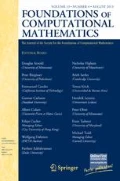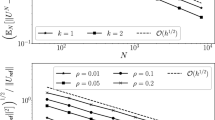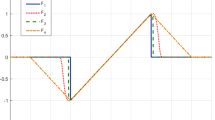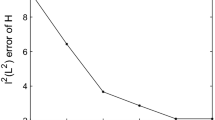Abstract
In this paper, we introduce a randomized version of the backward Euler method that is applicable to stiff ordinary differential equations and nonlinear evolution equations with time-irregular coefficients. In the finite-dimensional case, we consider Carathéodory-type functions satisfying a one-sided Lipschitz condition. After investigating the well-posedness and the stability properties of the randomized scheme, we prove the convergence to the exact solution with a rate of 0.5 in the root-mean-square norm assuming only that the coefficient function is square integrable with respect to the temporal parameter. These results are then extended to the approximation of infinite-dimensional evolution equations under monotonicity and Lipschitz conditions. Here, we consider a combination of the randomized backward Euler scheme with a Galerkin finite element method. We obtain error estimates that correspond to the regularity of the exact solution. The practicability of the randomized scheme is also illustrated through several numerical experiments.


Similar content being viewed by others
References
H. Amann. Linear and Quasilinear Parabolic Problems. Vol. I: Abstract Linear Theory, volume 89 of Monographs in Mathematics. Birkhäuser Boston, Inc., Boston, MA, 1995.
H. Amann. Compact embeddings of Sobolev and Besov spaces. Glasnik Matematicki, 35(55):161–177, 2000.
A. Andersson and R. Kruse. Mean-square convergence of the BDF2-Maruyama and backward Euler schemes for SDE satisfying a global monotonicity condition. BIT Numer. Math., 57(1):21–53, 2017.
W. Arendt and M. Duelli. Maximal \(L^p\)-regularity for parabolic and elliptic equations on the line. J. Evol. Equ., 6(4):773–790, 2006.
C. Baiocchi and F. Brezzi. Optimal error estimates for linear parabolic problems under minimal regularity assumptions. Calcolo, 20(2):143–176, 1983.
R. E. Bank and H. Yserentant. On the \(H^1\)-stability of the \(L_2\)-projection onto finite element spaces. Numer. Math., 126(2):361–381, 2014.
C. Carstensen. Merging the Bramble-Pasciak-Steinbach and the Crouzeix-Thomée criterion for \(H^{1}\)-stability of the \(L^{2}\)-projection onto finite element spaces. Math. Comp., 71(237):157–163 (electronic), 2002.
C. Carstensen. An adaptive mesh-refining algorithm allowing for an \(H^{1}\) stable \(L^{2}\) projection onto Courant finite element spaces. Constr. Approx., 20(4):549–564, 2004.
K. Chrysafinos and L. S. Hou. Error estimates for semidiscrete finite element approximations of linear and semilinear parabolic equations under minimal regularity assumptions. SIAM J. Numer. Anal., 40(1):282–306, 2002.
D. S. Clark. Short proof of a discrete Gronwall inequality. Discrete Appl. Math., 16(3):279–281, 1987.
M. Crouzeix and V. Thomée. The stability in \(L_{p}\) and \(W^{1}_{p}\) of the \(L_{2}\)-projection onto finite element function spaces. Math. Comp., 48(178):521–532, 1987.
T. Daun. On the randomized solution of initial value problems. J. Complexity, 27(3-4):300–311, 2011.
M. Dindoš and V. Toma. Filippov implicit function theorem for quasi-Carathéodory functions. J. Math. Anal. Appl., 214(2):475–481, 1997.
E. Emmrich. Gewöhnliche und Operator-Differentialgleichungen. Vieweg, Wiesbaden, 2004.
E. Emmrich. Two-step BDF time discretisation of nonlinear evolution problems governed by monotone operators with strongly continuous perturbations. Comput. Methods Appl. Math., 9(1):37–62, 2009.
L. C. Evans. Partial Differential Equations. Graduate studies in mathematics ; 19. American Mathematical Society, 1998.
I. Gyöngy. On stochastic equations with respect to semimartingales. III. Stochastics, 7(4):231–254, 1982.
B. H. Haak and E. M. Ouhabaz. Maximal regularity for non-autonomous evolution equations. Math. Ann., 363(3-4):1117–1145, 2015.
S. Haber. A modified Monte-Carlo quadrature. Math. Comp., 20:361–368, 1966.
S. Haber. A modified Monte-Carlo quadrature. II. Math. Comp., 21:388–397, 1967.
W. Hackbusch. Optimal \(H^{p,\,p/2}\) error estimates for a parabolic Galerkin method. SIAM J. Numer. Anal., 18(4):681–692, 1981.
E. Hairer and G. Wanner. Solving Ordinary Differential Equations. Vol. II: Stiff and Differential-Algebraic Problems, volume 14 of Springer Series in Computational Mathematics. Springer-Verlag, Berlin, 2010. Second revised edition, paperback.
J. K. Hale. Ordinary Differential Equations. Robert E. Krieger Publishing Co., Inc., Huntington, N.Y., second edition, 1980.
S. Heinrich and B. Milla. The randomized complexity of initial value problems. J. Complexity, 24(2):77–88, 2008.
L. S. Hou and W. Zhu. Error estimates under minimal regularity for single step finite element approximations of parabolic partial differential equations. Int. J. Numer. Anal. Model., 3(4):504–524, 2006.
A. Jentzen and A. Neuenkirch. A random Euler scheme for Carathéodory differential equations. J. Comput. Appl. Math., 224(1):346–359, 2009.
B. Z. Kacewicz. Optimal solution of ordinary differential equations. J. Complexity, 3(4):451–465, 1987.
B. Z. Kacewicz. Almost optimal solution of initial-value problems by randomized and quantum algorithms. J. Complexity, 22(5):676–690, 2006.
A. Klenke. Probability Theory. A Comprehensive Course. Springer, London, 2nd ed. edition, 2014.
R. Kruse and Y. Wu. Error analysis of randomized Runge-Kutta methods for differential equations with time-irregular coefficients. Comput. Methods Appl. Math., 17(3):479–498, 2017.
A. Logg, K.-A. Mardal, and G. N. Wells. Automated Solution of Differential Equations by the Finite Element Method: The FEniCS book. Lecture Notes in Computational Science and Engineering; 84. Springer, Berlin, Heidelberg, 2012 edition, 2012.
A. Lunardi. Analytic Semigroups and Optimal Regularity in Parabolic Problems. Birkhäuser, Basel, 1995.
D. Meidner and B. Vexler. Optimal error estimates for fully discrete Galerkin approximations of semilinear parabolic equations. ArXiv preprint, arXiv:1707.07889v1, 2017.
E. Novak. Deterministic and Stochastic Error Bounds in Numerical Analysis, volume 1349 of Lecture Notes in Mathematics. Springer-Verlag, Berlin, 1988.
A. Ostermann and M. Thalhammer. Convergence of Runge-Kutta methods for nonlinear parabolic equations. Appl. Numer. Math., 42(1-3):367–380, 2002. Ninth Seminar on Numerical Solution of Differential and Differential-Algebraic Equations (Halle, 2000).
A. Prothero and A. Robinson. On the stability and accuracy of one-step methods for solving stiff systems of ordinary differential equations. Math. Comp., 28:145–162, 1974.
T. Roubíček. Nonlinear Partial Differential Equations with Applications, volume 153 of International Series of Numerical Mathematics. Birkhäuser/Springer Basel AG, Basel, second edition, 2013.
G. Stengle. Numerical methods for systems with measurable coefficients. Appl. Math. Lett., 3(4):25–29, 1990.
G. Stengle. Error analysis of a randomized numerical method. Numer. Math., 70(1):119–128, 1995.
J. F. Traub, G. W. Wasilkowski, and H. Woźniakowski. Information-Based Complexity. Computer Science and Scientific Computing. Academic Press, Inc., Boston, MA, 1988. With contributions by A. G. Werschulz and T. Boult.
H. Triebel. Interpolation Theory, Function Spaces, Differential Operators. North-Holland Publishing Company, Amsterdam-New York, 1978.
E. Zeidler. Nonlinear Functional Analysis and its Applications. 2/A, Linear Monotone Operators. Springer-Verlag, New York, 1990.
E. Zeidler. Nonlinear Functional Analysis and its Applications. 2/B, Nonlinear Monotone Operators. Springer-Verlag, New York, 1990.
Acknowledgements
The authors like to thank Wolf-Jürgen Beyn for very helpful comments on non-autonomous evolution equations and Rico Weiske for good advice on programming. Also we like to thank two anonymous referees for their valuable suggestions. This research was partially carried out in the framework of Matheon supported by Einstein Foundation Berlin. ME would like to thank the Berlin Mathematical School for the financial support. RK also gratefully acknowledges financial support by the German Research Foundation (DFG) through the research unit FOR 2402—Rough paths, stochastic partial differential equations and related topics—at TU Berlin.
Author information
Authors and Affiliations
Corresponding author
Additional information
Communicated by Arieh Iserles.
Publisher's Note
Springer Nature remains neutral with regard to jurisdictional claims in published maps and institutional affiliations.
Rights and permissions
About this article
Cite this article
Eisenmann, M., Kovács, M., Kruse, R. et al. On a Randomized Backward Euler Method for Nonlinear Evolution Equations with Time-Irregular Coefficients. Found Comput Math 19, 1387–1430 (2019). https://doi.org/10.1007/s10208-018-09412-w
Received:
Revised:
Accepted:
Published:
Issue Date:
DOI: https://doi.org/10.1007/s10208-018-09412-w
Keywords
- Monte Carlo method
- Evolution equations
- Ordinary differential equations
- Backward Euler method
- Galerkin finite element method




